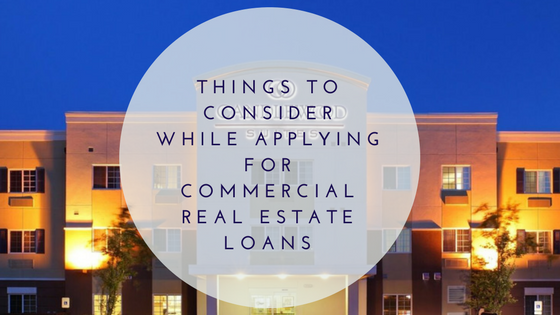Are you buying real estate for your business? Sounds like an exciting move, but also a very stressful one! Don’t worry; we’ve got your back!
Expanding your business? Renovating your current business space? It could be a big step and thus, it’s necessary for you to know the entire process before you test the waters.
When you learn the nuances of navigating through the commercial real estate loans, you will be armed with plethora of relevant information that will help you obtain the best terms and rates for your venture. This way, you could make the most out of the commercial real estate loans and save some capital for your venture!
There are plenty of things you need to consider while applying for commercial real estate loans. We, at Private Capital Investors, are well informed to help you obtain all the necessary information you may need.
Let us start with the fundamentals.
What is it?
Commercial real estate is basically the real estate that is used for serving business purposes. Are you operating your business from an office space or a retail store? That space is the commercial real estate. When you have plans for expanding your business or starting a venture, you can seek commercial real estate loans to help yourself in financing your venture.
Commercial real estate loans can be taken by any legally formed business entities, such as an S-Corporation or a limited liability company (LLC). This means individuals cannot seek commercial real estate loans.You may have the experience of applying for residential mortgages, but obtaining a commercial real estate loans can be a rigorous process. If you are new to this, do not worry and get confused by all the jargon. Our financial experts at Private Capital Investors possess immense knowledge in commercial real estate loans. However, to help you clear the initial hurdles, just follow along as we help you equip with this knowledge.
Do Your Research
All forms of lending have their own lingo. If you feel that you are an alien to this lingo within the commercial real-estate industry, try to make an effort and learn it prior to starting the commercial real-estate loan process, because miscommunication can often lead to unexpected outcomes. You can get acquainted with few concepts which will make it easy for you to communicate with the lenders. We understand that you may not be an expert in each of the concepts as below, however, with our experience, we tell you that you need to know these three important terms.
Loan to Value or LTV – This is the sum of loan you can obtain depending on the value your property has got on the market.
Debt Service Coverage Ratio: It is a crisp calculation which determines your capacity of making payments of loans on a monthly basis.
Cap rate: It offers borrowers and lenders with effortless ways to compare between various commercial real estate values. Remember that the cap rates differ from location to location.
Types of commercial real estate loans
Bridge Loan
This loan gives you instant cash so you can finance immediate needs of your projects. These are short termed loans with a term of a year or so and can be obtained while you are waiting for the long-term financing. Such loans are generally provided by private lenders. Such loans may require you to have great credit scores as well as proof of incomes. You may also have to show them you have enough money to cover the existing expenses of the property as well as the new loan!
Real Estate Purchase Loan
These are akin to commercial mortgages with adjustable rates or fixed rates. If you want to qualify for this loan, you need to have credit scores higher than 700, and also major savings in your personal account as well as business account. Lenders will want the commercial real estate of yours to be used as the collateral and the rate of the loan is fixed by Loan to Value ratio.
Hard Money Loan
A hard money loan or private capital is just another definition of a soft loan that is secured by real estate collateral. As the name might suggest, these loans are offered by Private Lenders who have considerable capital to invest, but due to the risk profile of lending their private money to fund these loans, lenders will want to ensure that the underlying property has the best chance to provide collateral in the event of a default. As a consequence, such loans typically have high interest rates. Such loans are an option and often a savings grace to borrowers when the time is of utmost essence.
Joint Venture Loan
Such loans are okay when parties involved will share the profits and losses alike made from the property. Such loans can be helpful if neither of the parties is able to get proper financing individually. Investment firms and Private investors generally offer such joint venture loans. Here, two partners, although officially unrelated to the real estate, can apply for loans.
Participating Mortgage
In such a loan, the lender can share the revenue that your commercial property generates. The lender gets the mortgage payment every month along with the interest on the loan amount, as well as a part of property’s sales proceeds or rental incomes. Such loans have gained popularity among retail and office properties where stable tenants would have signed leases for long terms!
Now that we’ve told you about the types of commercial property loans, we are sure you’ve got certain clarity on what exactly you should be looking for.
How do these loans work?
Well, to begin with, these loans support you in paying high prices that come along with your new venture. What you need to know is that these are mortgage loans on your commercial properties and not on residential properties.
While you’re accepting the lien put on your commercial property, you may also have to be prepared to make a down payment on the commercial real estate loans if you are purchasing a property. Such down payment will generally be between 20 to 30 percent. Private Capital Investors can be of great help in determining these conditions in more details.
And now comes the rivets of commercial real estate loans!
- Repayment Terms and Schedules
Unlike your residential loans, the commercial real estate loans have two types of terms. They’re either intermediate-term loans (3 years or less) or long-term loans (5-20years).
- Interest Rates
Just like any other small business loans, the rate of interest you may have on the commercial real estate loans are based on the kind of business you run, its financial strength and your credit scores. However, these loans come at higher rates when compared to residential mortgages. This is because businesses can be riskier to lend money to, especially in the case of Startups. Besides, many businesses have low credit profile and a history when compared to individuals.
Also, the interest rates depend on the lender you’ve chosen. Life Insurance Companies have rates ranging from 3.35% to 4.3% while credit unions or banks have rates from 3.35% to 6%. The interest rates also depend on the LTV (Loan to Value) ratio.
- Fees
Along with the interest rates, commercial loans also have fees that you need to pay upfront. Such fees are usually clubbed with the whole amount of the loan which would cover legal costs, loan application, property appraisal, loan origination as well as the survey fees. Few lenders may want to borrow these fees before the loan is sanctioned. Others may just collect the fees on a yearly basis.
Go for loans that fit your needs
Now that you know the mechanics of the commercial real estate loans, you should also know that there is no standard type for such loans. Loans can differ depending on the type of property you have, your cash flow requirements and other parameters. Thus, look for a commercial property loan that is suitable for your goals and needs. A commercial placement advisor, such as Private Capital Investors, can help you take care of all these requirements.
Now that you have considered the requisites of commercial real estate loans, where will you find the loans?
There are different sorts of lenders who provide this type of financing. The main ones are Credit unions, Life Insurance Companies, Commercial Banks, CMBS lenders (commercial mortgage-backed security), Small Business Administration and private lenders.
Application for commercial real estate loans
We have a very efficient team that has helped plenty of people apply for the loans they need. With that expertise, we tell you that commercial mortgages usually have complex underwriting procedures when compared to those of residential loans. With these loans, it is necessary that you have a fully detailed business plan. Lenders don’t just look into your business but also consider your intentions on how you use the money. Thus, ensure that you detail out your business plan convincingly.
Based on the loan amount, you will also be required to provide proof for the financial strength of your business. You must be prepared with a minimum of 2-3 years of financial documents such as tax returns, asset statements, corporate accounting reports and other necessary information. You will also be asked to show your personal credit score history and financial information.
The Conclusion
We, at Private Capital Investors, have aided many business owners. And we’ve always asked them to go through all the offers from different lenders. This is because your loan will be with you for a long time, and thus, you should ensure that you’re getting the best rates and terms for the business. It is our job to ensure that you are secure!
Once you have got the perfect fit, you can set on the journey of making your new venture into a successful one!





